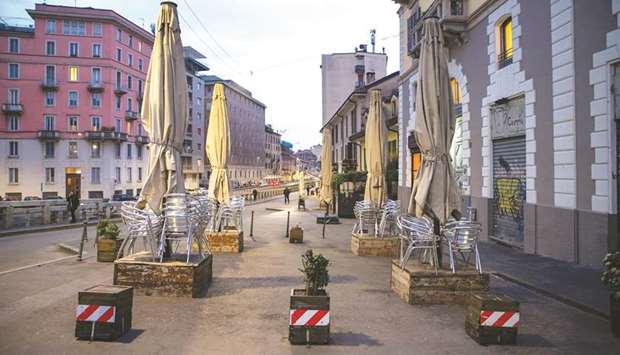Italy’s financial hub Milan grappled yesterday with a worsening of the coronavirus outbreak, as business events including the annual Salone del Mobile design fair were delayed or cancelled and the national death toll rose to 14.
Cafes and restaurants in the city of 1.3mn people were half empty, far fewer people than usual were using public transport and hotels reported a wave of cancellations.
Other northern towns and cities including Venice saw similar trends.
“We’re wondering whether to close properly until the situation gets back to normal. There are even fewer people today than yesterday,” said the operator of a restaurant in central Milan, which is normally packed with bankers and office workers at lunchtime. “We can’t take another week like this.”
One more death and new cases of the virus were reported, all in northern Italy, while countries around Europe reported additional infections linked to the Italian flare-up. The number of people confirmed to have contracted the illness rose by more than 100 to 528.
The European Union’s health chief Stella Kyriakides, on a visit to Rome, cautioned against panic as Italy’s government prepared measures to try to bolster the economy, which looks certain to tip into recession as a result of the contagion.
Underscoring the concerns, the annual Salone del Mobile design and furniture fair, one of the highlights of the city’s business calendar, was postponed from April until June.
The head of the national Civil Protection agency, Angelo Borrelli, told reporters the death toll had risen to 14 from 12 the day before, with a 69-year old man dying in the northern region of Emilia Romagna.
As with all the other people who have died so far, the man had underlying health problems that made him particularly vulnerable to the disease.
In all, some 258 cases have been registered in the epicentre of Lombardy since Friday, including a four-year-old girl and five other children — the first such infections in the country.
In neighbouring Veneto, the number of people confirmed to have caught the flu-like virus was 71, while instances of the illness surfaced in eight other regions, pushing the total number of cases nationwide above 370.
Italians or people who had recently visited the north of the country have tested positive in Greece, Spain, Austria, Switzerland, Croatia and France since the weekend, showing how fast the illness — which was first identified in China last month — could spread.
“This is a situation of concern, but we must not give in to panic,” Kyriakides said after meeting Italy’s health minister and the regional head of the World Health Organisation (WHO).
“There are still many unknowns about this virus and in particular its origin and how it spreads.”
Authorities have shut schools, universities, museums, cinemas and theatres across much of northern Italy and many countries have advised their nationals not to visit the area.
“We should stay calm, there is no reason to be particularly afraid,” said Elisabetta Jacona, a Milan resident and doctor.
“The only advice I can give, as a doctor, is telling people who are more at risk, elderly people or people with previous pathologies... to avoid going out.”
Analysts have warned that the outbreak could shunt Italy’s fragile economy into its fourth recession in 12 years, with retail and tourism especially vulnerable.
The government said it was working on measures to help businesses.
“In the coming days, we will meet trade unions and companies to work out these measures in detail and to prepare a more comprehensive shock therapy to accelerate investment spending,” Prime Minister Giuseppe Conte told Corriere della Sera daily.

Seats are seen stalked outside a closed restaurant in Milan. Cafes and restaurants in the city of 1.3mn people were half empty, far fewer people than usual were using public transport and hotels reported a wave of cancellations yesterday.
